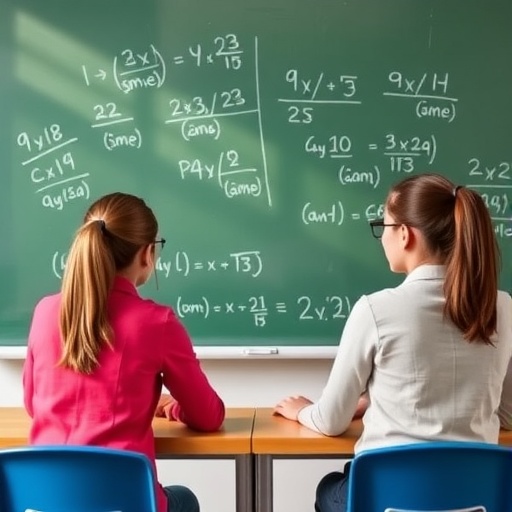Mathematics holds a distinctive position within educational disciplines due to the complex interplay between cognitive skills and emotional responses it often engenders. Among these emotional responses, mathematics anxiety stands out as a prevalent challenge, impacting approximately one in six students worldwide. This anxiety manifests as a specific fear or apprehension toward mathematics-related tasks, which can significantly hinder academic performance and motivation. Recent empirical insights from the University of Eastern Finland have shed light on the nuanced relationships between mathematical performance, anxiety, self-efficacy, and instructional methodologies, revealing critical factors that educators must consider to enhance learning outcomes effectively.
Central to the research is the observation that students who demonstrate lower proficiency in mathematics are more susceptible to heightened mathematics anxiety. This anxiety is not uniformly distributed across demographics; the study highlights a statistically significant trend showing that female students frequently report higher levels of mathematics anxiety compared to their male counterparts. Such gender disparities underscore the importance of tailored educational interventions and suggest that psychological barriers, in addition to cognitive challenges, influence mathematical achievement.
The research specifically examined sixth-grade students in Finland, a cohort undergoing pivotal developmental phases where academic attitudes begin to solidify. The study scrutinized the interrelations among mathematics self-efficacy, test anxiety, and actual performance metrics. Self-efficacy, defined as an individual’s confidence in their capacity to tackle mathematical problems, emerged as a pivotal element influencing both motivation and academic success. Intriguingly, while self-efficacy and performance exhibited a reciprocal relationship—where previous success bolstered confidence, which in turn supported better future performance—the anticipated reciprocal relationship between self-efficacy and test anxiety was not observed. This finding nuances our understanding of emotional and cognitive interactions in the learning process.
Dr. Hans Lehikoinen, the study’s lead author, emphasizes the significance of self-efficacy in fostering resilient mathematical engagement. Regardless of prior achievement, students with high self-efficacy consistently outperformed others, indicating that psychological empowerment can transcend initial skill deficits. This phenomenon suggests that interventions aimed at bolstering students’ beliefs in their mathematical abilities could serve as potent catalysts for improved educational outcomes, promoting a positive feedback loop where performance gains reinforce confidence, thereby sustaining long-term motivation.
Moreover, the study explored pedagogical approaches, particularly the concept of co-teaching, wherein two educators collaboratively deliver instruction by sharing responsibilities and resources. Co-teaching is often posited as a strategy to enhance personalized support, diversify teaching methods, and create a more inclusive classroom environment. However, the findings revealed no statistically significant advantages in mathematics anxiety, self-efficacy, or performance when comparing co-taught classes against those taught solely by a single instructor. This outcome suggests that while co-teaching has potential, its effectiveness may depend on implementation fidelity and the integration of targeted strategies addressing motivational factors.
The intricate relationship between anxiety and performance necessitates differentiated intervention strategies. Mathematics anxiety reduction requires direct and multifaceted approaches that extend beyond skill development. Addressing the psychological distress linked to testing scenarios is particularly critical, as test anxiety can independently impair performance and skew evaluations of a student’s true capabilities. This is especially pertinent for students who already struggle academically, underscoring the urgency for supportive measures that mitigate stress and foster a growth-oriented mindset.
Reducing anxiety in evaluative contexts can be operationalized through diverse, evidence-based techniques. Employing low-stakes assessments, providing flexible timing, and cultivating an educational culture that normalizes and learns from mistakes are foundational strategies endorsed by educational psychologists. Such environmental modifications aim to decouple learners’ self-worth from singular performance outcomes, thereby reducing pressure and facilitating a more accurate reflection of student knowledge and skills.
The findings also invite a reconsideration of co-teaching’s role in supporting motivational and emotional dimensions of mathematics education. While co-teaching has been linked theoretically to increased student engagement and differentiated instruction, this research advocates for supplementary, targeted pedagogical protocols that explicitly address motivational constructs like self-efficacy and anxiety. Developing these approaches requires an iterative process of pedagogical refinement informed by rigorous empirical evaluation.
Gender disparities in mathematics anxiety revealed by the study also call for specialized interventions sensitive to socio-cultural and psychological factors influencing female students. Encouraging female participation and reducing stereotype-threat-related anxieties could involve mentorship programs, inclusive curricula that highlight diverse mathematical role models, and classroom climates that challenge gender-based biases. These measures, combined with broader systemic reforms, could progressively narrow the gender gap in mathematics anxiety and achievement.
This investigation into the psychological and instructional dynamics of mathematics learning contributes substantially to our understanding of how cognitive and emotional factors intertwine within educational contexts. It underscores the primacy of fostering robust mathematical self-efficacy and highlights the complex challenge of alleviating anxiety through scalable and sustainable interventions. Consequently, these insights bear significant implications for educators, policymakers, and researchers committed to advancing mathematics education and equity.
In summation, the University of Eastern Finland’s study delineates a clear trajectory: enhancing students’ self-efficacy offers a viable pathway to improve mathematics achievement, while simultaneously addressing mathematics and test anxiety necessitates comprehensive, multidimensional strategies. Although co-teaching alone may not suffice to influence these dynamics appreciably, it remains a potentially valuable component within a broader pedagogical framework. Future research must endeavor to refine such integrative approaches, ensuring that mathematical education fosters both competence and confidence for all learners.
Subject of Research: Mathematics self-efficacy, test anxiety, and performance among sixth-grade students, with an examination of co-teaching effects.
Article Title: Not explicitly provided in the content.
News Publication Date: 17-Sep-2025
Web References: http://dx.doi.org/10.1080/00313831.2025.2558722
References: Scandinavian Journal of Educational Research
Image Credits: Not provided.
Keywords: mathematics anxiety, self-efficacy, test anxiety, mathematics performance, co-teaching, educational psychology, gender differences, motivation in education, classroom assessment strategies




